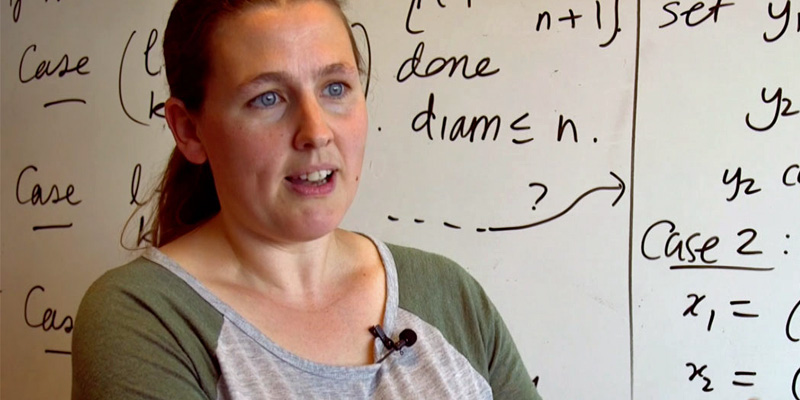Sarah Hart is Professor of Mathematics and Head of the Department of Economics, Maths and Statistics at Birkbeck , University of London. She studied at the University of Oxford, the University of Manchester and UMIST. Sarah is organising a Women in Maths event supported by the London Mathematical Society and the global investment management firm Winton , aiming to encourage more girls and women to keep studying mathematics.
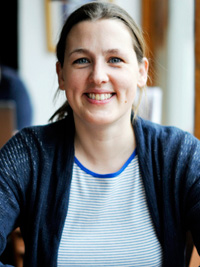
“…The idea that you can, just with logical argument, show that something is true – always, anywhere, in any language and for all time – is incredibly powerful and beguiling…”
Mathematics is about patterns and symmetry
Since I was a young child, I have always loved patterns and puzzles. My favourite toy as a toddler was a set of painted wooden tiles which I would spend ages making into different symmetrical patterns.
I loved the fact that numbers went on for ever, and was delighted with discoveries like the fact that you can use one piece of knowledge to derive infinitely many others (for example if you know 5 times 6 is 30, then somehow encapsulated in that are the facts that 5 times 60 is 300, and 5 times 600 is 3000 – I mention this one because I have a vivid memory of announcing it as a great discovery to my amused mother when I was five).
To me, mathematics is all about patterns and symmetry: finding them and understanding what’s behind them. As I got older I learnt about mathematical proof, and that made me love mathematics even more. The idea that you can, just with logical argument, show that something is true – always, anywhere, in any language and for all time – is incredibly powerful and beguiling.
Going to university … and never leaving!
After school, a natural next step was to study mathematics at university. Somehow I never left! I did a Masters and then a Ph.D., specialising in an area of mathematics known as group theory, which is the mathematical tool for analysing symmetry. I got my Ph.D. in 2000, aged 25; I had a couple of research grants and a temporary lecturing post before landing a permanent lectureship at Birkbeck in 2004.
I’m very lucky in that I really enjoy teaching and communicating about mathematics, as well as doing research, so being an academic is my ideal job! I was gradually promoted to senior lecturer, then reader, and finally professor in 2013, and my two children were born in 2007 and 2010. It’s been a busy time! I became Head of Department in September 2016 so I am quite new to the role.
My role as Head of Department
My current role involves several different aspects including research, management and teaching. Each day is different and usually involves juggling all three of these.
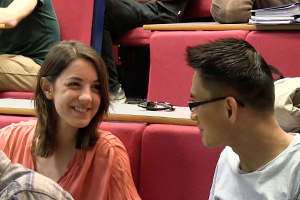
I’m pretty good at admin but my true passions are teaching and research. In research, I have my own projects where, sometimes by myself but mostly with collaborators and research students, we are trying to investigate new ideas and hopefully prove some good theorems. I am also head of the Mathematics Research Group in the department, so I am mentoring colleagues in their research too.
I’m regularly asked to give talks at conferences or at other universities about my work. I strongly believe in the importance of outreach and public engagement, so I get involved in things like workshops with local schools, public lectures aimed at non-mathematicians, and events for women in mathematics. My role also involves teaching, so I prepare and deliver lecture courses, at the moment at Masters level, in specialist mathematics topics.
Challenging societal beliefs that girls aren’t as good at maths as boys
It’s a Government priority to get more girls studying Mathematics at A-Level. At the moment, around 40% of the students who take A-level maths are girls, so there is an imbalance here, and the worrying thing is that this proportion has been static for the last ten years.
It’s hard to know exactly why there is such a disparity but my feeling is that a big part of it is the societal belief that girls aren’t as good at boys at maths, even though this is not borne out in exam results. Girls perceive themselves not to be as good and are likely to drop maths after GCSE unless it is obviously one of their strongest subjects.
High-achieving girls tend to be more likely to get 9 or 10 A or A* grades at GCSE (we have probably all observed the “be perfect” societal ideals for girls that cause that). This means they have more choice at A-level and seem to be less likely to opt for maths in those scenarios. I certainly remember my confidence being knocked on a couple of occasions where if teachers and family hadn’t reassured me, I might have been put off maths.
Being a good mathematician: Tenacity and intuition required

There’s also the question of what advice girls are given if they do excel. I remember my own school days when if a girl was good at science and maths she would be automatically steered towards medicine by the school and the family, which is great for medicine but not so great for maths. I think to deal with this we must actively tell girls that are doing well that they should consider taking maths further.
One could also point out that it’s been shown that A-level maths is the single best predictor of high lifetime earnings! I also feel that the presence of women role models is very important – not the impossible unattainable ideal kind, but just normal women getting on with the normal job of being a mathematician.
We can’t wait until 2186 for gender parity
I believe we all have a responsibility to do what we increase the numbers of women in mathematics. It’s tempting to think that things will be OK if we just wait – after all, 100 years ago there were no female maths professors at all. It’s true that things are changing, but the World Economic Forum recently calculated that gender parity will not be achieved until 2186, and I’m certainly not prepared to wait that long!
So, in March 2017 I’m involved with organising two one-day events aimed at encouraging girls and young women to consider pursuing a career in mathematics. Day 1 is the Winton Women Trailblazers in Mathematics conference. It is for girls in years 11-13 at school, where they can meet women working in mathematics and statistics and get an idea of what it’s like to take the subjects further. The second day, which is also supported by the London Mathematical Society, is a Women in Mathematics day, bringing together postgraduate and postdoctoral students to meet fellow mathematicians and hear from established women mathematicians from academia and industry about their work and careers.
Beating the less than one in a million odds of becoming a female maths professor
With 40% of the maths A-level students being female, things don’t sound too bad. But at every step along the way in academia, this proportion decreases, so at degree level about 30-35% of students are female, but then only 20-25% of junior lecturers are women. By the time we get to professors, it’s less than 10%.
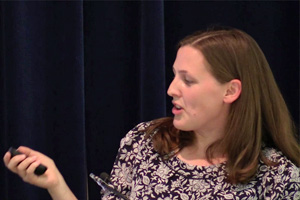
Of course, pure chance is not the only thing at work here. My career path has been down to a lot more than innate talent. Firstly, I had good role models, at school and university. Yes, people told me boys were better than girls at maths, but that was counteracted by positive support from others.
I am very lucky that my husband is extremely supportive of me, and he’s never expected me to do all the housework or childcare. We share those roles and he does his bit. My college, Birkbeck, is really generous with maternity leave so I was able to take plenty of time off with both my girls, and to work quite flexibly on my return. All these things are really important.
As far as personal qualities go, obviously, I do have some mathematical ability but more important than that I think is that I’m really stubborn(!) and I keep persisting at problems until I crack them. That kind of obstinacy is what’s needed to keep applying for jobs, keep submitting research applications and research papers, even when (as in the case of research grants) at least ten applications are received for every grant available.
Not all mathematicians are super-geniuses…
In mathematics, and probably in academic mathematics particularly, it’s really important to have a growth mindset. The perception of mathematicians may be that we are all super-geniuses who have flashes of inspiration that lead us to make great discoveries. But actually, the reality is that (apart from a few exceptional people) most researchers, including the very good ones, have to spend months or years working on a problem before they make a breakthrough.
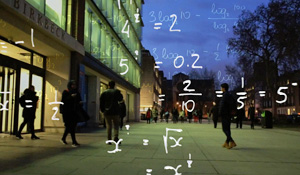
The short, neat, proofs that students and others see are the outcome of a great deal of fine tuning, and 90% of what we do has to be discarded in the process. If we only judged ourselves by looking at the outcomes of others, we would all just give up! The way to be a good mathematician is to be a good learner of mathematics. It’s not where you are, it’s where you are going that matters.
Forget the stereotypes of old men with long white beards
There is still gender stereotyping in maths and related careers. I was amused when my daughter, then aged five, asked me if it’s possible for men to be mathematicians. I was the only mathematician she knew. In the general population, of course this is often reversed, the well-known ‘science’ people being Einstein, Newton etc. If you ask someone to draw a picture of a maths professor, you’ll probably get an old white man with a long white beard.
I think the way to address this is to try and make sure the portrayals of these jobs involve diverse people – women, men, BAME professors, and so on. We don’t have to force it down people’s throats (I was once introduced at a talk as “this is Sarah Hart, she’s a woman, a mother, and a professor, ALL before the age of 40,” which was a bit excruciating!) but just try and show people that yes, there are women in these roles.
Busy, action-packed and exciting
It’s a time of rapid change for us and for all academic institutions. The ramifications of Brexit as well as Government policy such as removal of financial support for students with disabilities, and the introduction of the “Teaching Excellence Framework”, which ties certain metrics to the fees universities need to charge students, means a state of flux for all of us.
In our department, we are currently working on ways to support our students better, to provide more options about ways to study, whether that’s online distance learning programmes for students who can’t any longer obtain visas to come here and study in person, or increasing the range of subjects we teach in the evenings for London-based students who want or need to combine work with study.
On the research side, I have quite a few irons in the fire, with interesting projects ongoing with colleagues in the department (including my three Ph.D. students) as well as elsewhere in the UK. I get invited to give public lectures on a fairly regular basis – I’m quite excited about one in June I’m giving for Gresham College in London on the friendship and exchange of letters between the mathematician Donald Coxeter and the artist M.C. Escher, which influenced both their work in really interesting ways.
With my leadership of the department, my own research, teaching and public engagement activities, and on the home front two daughters in primary school, it is a busy, action-packed but very exciting time!
http://www.bbk.ac.uk/ems/faculty/hart
https://twitter.com/prof_sarah_hart
https://twitter.com/BirkbeckBEI

